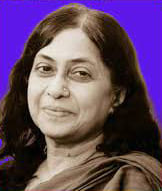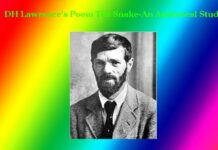Kamala Das | Forest Fire | Analytical Study
Kamala Das Poem ‘Forest Fire’-An Analytical Study
Kamala Das’s poem ‘Forest Fire’ delves into the depths of human desire and the insatiable hunger for life’s experiences. The poem’s central theme revolves around the overwhelming need to embrace and consume all that life has to offer, likened to a fierce forest fire that engulfs everything in its path. Through vivid imagery and skillful use of literary devices, Kamala Das crafts a powerful portrayal of human existence and the passage of time.
The theme of ‘Forest Fire’ is the intense craving for life’s experiences, emotions, and memories. The poet’s persona, expressed through the speaker, desires to absorb everything that comes her way with an unyielding hunger. The metaphor of a forest fire represents the relentless and wild nature of this longing, which only intensifies with each new encounter. The poet’s desire for life is so overwhelming that it consumes everything in its wake, much like a raging fire leaves nothing but ashes behind.
The poem captures various aspects of life through its imagery, symbolizing the innocence of youth with the “bald child in open pram,” the passion of love with the “slim lovers behind the tree,” and the wisdom of age with the “old man with paper in hand.” These symbols showcase the full spectrum of human experiences, and the poet seeks to embrace them all. In her quest to experience and absorb everything, the speaker envisions preserving these memories and emotions within herself, creating a cyclical and timeless existence that encompasses the different stages of life.
Furthermore, ‘Forest Fire’ emphasizes the interconnectedness of humanity and the universal nature of human emotions. The poet sees herself as a vessel that carries the collective experiences of all people. Including various symbols such as street lamps, cabaret girls, wedding drums, eunuchs, and a dying mother signify the diversity of life and the shared experiences that unite all human beings. The poem’s theme suggests that despite the fleeting nature of life, the memories and emotions that shape us endure, transcending time and space.
In this poem, Kamala Das has employed many literary devices such as metaphor, symbol, repetition, personification, alliteration etc., and makes it a fine piece of poetry.
.
The central metaphor of a “forest fire” serves as the backbone of the poem. It is a powerful and vivid comparison that vividly portrays the all-encompassing nature of the poet’s desires. The use of this metaphor helps readers visualize the intensity of the speaker’s hunger for life’s experiences.
.
The poem is replete with symbolic elements that represent various stages of life and different human experiences. The “bald child in open pram” symbolizes innocence and youth, while the “slim lovers behind the tree” embody passion and romance. The “old man with paper in hand” represents wisdom and experience. These symbols enrich the poem and add depth to the theme.
The repetition of “and on and on” emphasizes the eternal nature of memories and experiences. It reinforces the idea that the poet’s desire to absorb life’s moments is boundless and will continue indefinitely.
The personification of the poet’s “eyes” and “nerves” as entities that “lick” and “consume” respectively adds a vivid and dynamic dimension to the speaker’s hunger, as if her senses have taken on a life of their own.
The poet uses alliteration, such as “slim lovers,” “wedding drums,” and “dying mother,” to create a musical quality to the poem, drawing attention to specific moments and intensifying their impact.
In conclusion, Kamala Das’s poem ‘Forest Fire’ presents a profound exploration of the human thirst for life’s experiences. Through the skillful use of literary devices such as metaphor, imagery, symbolism, repetition, and personification, the poet vividly depicts the speaker’s insatiable hunger for existence. The theme of the poem highlights the cyclical and timeless nature of human emotions and memories, emphasizing the interconnectedness of all people and the enduring impact of the moments that shape our lives. ‘Forest Fire’ invites readers to reflect on the richness and impermanence of life and the beauty of embracing all that it offers. 0 0 0.
Kamala Das Forest Fire Analytical Study
N. B. The article ‘Kamala Das Forest Fire Analytical Study’ originally belongs to the book ‘Analytical Studies of Selected Indian English Poems‘ by Menonim Menonimus.
Books of Literary Criticism by M. Menonimus:
- World Short Story Criticism
- World Poetry Criticism
- World Drama Criticism
- World Novel Criticism
- World Essay Criticism
- Indian English Poetry Criticism
- Indian English Poets and Poetry Chief Features
- Emily Dickinson’s Poetry-A Thematic Study
- Walt Whitman’s Poetry-A Thematic Study
- Critical Essays on English Poetry
- Tawfiq al-Hakim’s Novel: Return of the Spirit-An Analytical Study
- Tawfiq al-Hakim’s Novel: ‘Yawmiyyat Naib Fil Arayaf’-An Analytical Study
- Analytical Studies of Some Arabic Short Stories
- A Brief History of Arabic Literature: Pre-Islamic Period (500 AD-622 AD)
- A Brief History of Arabic Literature: Early Islamic Period (622 AD-661 AD)
- Reviews on William Shakespeare’s Works
- Reviews of Charles Dickens’ Works
- Reviews of John Milton’s Literary Works
- Reviews of Some Iconic Travelogues
- Shakespeare’s Sonnets-Critical Studies
- Analytical Studies of Selected Poems of Sarojini Naidu
- Analytical Studies of Selected Poems of Rabindranath Tagore
- Analytical Studies of Selected Indian English Poems …
Additional Searches :
- Indian Poems
- Top 10 Indian English Poets
- Indian English Poets
- Indian Poetry in English
- Themes and Characteristics of Nissim Ezekiel’s Poetry
- Nissim Ezekiel
- Poetry of Nissim Ezekiel











